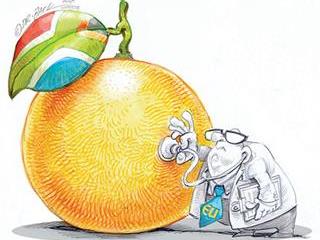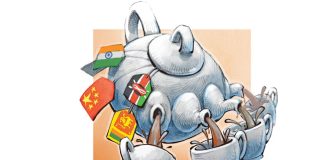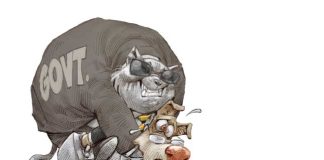
A large section of the South African citrus industry heaved a collective sigh of relief on 29 May when the European Union’s committee on plant health announced that it would not ban imports of SA citrus into Europe after instances of Citrus Black Spot (CBS) were again discovered on oranges destined for EU export. While Europe is not South Africa’s only citrus export destination, the region accounts for about R8 billion in fruit export revenue for South Africa every year, supporting an industry directly responsible for over 100 000 jobs.
And while the last EU ban was little more than symbolic – coming at the end of the 2013 export season – this recent threat would have had significant negative implications for our local citrus market. It is surprising, therefore, that the risk of such a ban has not resulted in a far greater reaction by all stakeholders in this vital sector. This is especially true given that the EU’s decision was accompanied by stricter import conditions for SA fruit and a stern warning that, should these conditions fail to be met, the ban was still a very real possibility in the future.
According to the EU’s conditions, five interceptions of fruit CBS entering the EU could result in a full ban. Given that South Africa exports more than 650 000t of citrus to the region per year, five interceptions is not a generous allowance, and it will take a concerted effort at every point in the value chain to ensure that these onerous conditions are not breached.
No time for a blame game
Such a warning shot across the bow of the citrus industry should prompt everyone dependent on citrus exports to commit to ensuring that the full ban is never instituted. All stakeholders along the supply chain must take responsibility for future quality control and should not be tempted to point fingers. Following the ban scare, government has been accused of not doing enough to plead South Africa’s case with the EU, citrus associations have accused the EU of unfairly singling out South Africa for scrutiny, and farmers have been blamed for failing to prioritise and invest in adequate pest control measures.
Each accusation carries some truth, but no amount of finger pointing will stop five interceptions of CBS-infected fruit. What is needed is a willingness by all parties to accept accountability and do their share. For its part, the Citrus Growers’ Association (CGA) does excellent work in ensuring that farms are inspected and CBS risks are addressed timeously. But unless farmers accept their responsibility in doing all they can to prevent CBS-infected fruit entering EU export channels, the CGA’s efforts could prove ineffective.
For the foreseeable future, the eyes of the EU will be firmly focused on South Africa’s oranges, and competitors like Spain are waiting for a slip-up that will shut down our citrus exports. Should this happen, the consequences will extend far beyond SA farmers having to find alternative markets. The resultant risk premium increase would almost certainly make capital markets far more difficult to access for SA farmers, and the negative impacts would be felt by the industry long after such a ban is lifted.
The CBS situation holds a lesson for SA agriculture. For any agricultural undertaking to be truly sustainable, it has to be built on a ‘bigger picture’ view that prioritises the long-term benefits of sincere accountability. Without such a willingness to accept shared responsibility for the future of an industry, all other efforts to ensure its sustainability could easily come to nought.
A consignment of SA citrus with CBS was intercepted in the Netherlands on 18 July 2014, subsequent to the writing of this article. This was the EU’s first interception of CBS on South African fruit this season. The department of agriculture and the CGA promised swift action, and the CGA’s special envoy to the EU, Deon Joubert, was sent to Europe for discussions.
The views expressed in our weekly opinion piece do not necessarily reflect those of Farmer’s Weekly.













